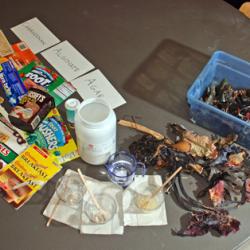Source Institutions
Source Institutions
Add to list Go to activity
Activity link broken? See if it's at the internet archive

In this activity, learners examine the properties of different seaweeds, investigate what happens when powdered seaweed (alginate) is added to water, and learn about food products made with seaweed. Instructions are provided for facilitating three stations at a table in an aquarium or museum, but the activities can be done anywhere. Background information is provided about seaweed and its use in foods, and learners realize how common it is (it's in toothpaste, ice cream, pudding, and even chocolate milk).
- 30 to 45 minutes
- 10 to 30 minutes
- $5 - $10 per group of students
- Ages 4 - adult
- Activity
- English
Quick Guide
Materials List (per group of students)
- 6 foot table
- Chair (optional)
- Table cover
- 1-2 stools
- Small samples of brown, red and green seaweed
- Plastic animal tub, small or large, 1/4 full of seawater
- Dried seaweed, natural and/or packaged (optional)
- Alginate (powdered brown seaweed)
- 1 oz. plastic cups with lids (enough for one set per participant) or 3 oz. paper cups
- Beaker or jar of fresh water
- Wooden stir sticks, 3-4 depending on number of participants
- Damp cloth
- 5-6 Product containers/boxes with seaweed in ingredients
- 3-4 Magnifying lens
- Laminated list of seaweed “code names” found in ingredients lists
- Directions for reading lists (used if only one presenter)
Subjects
-
Earth and Space Science
-
Earth Structure
- Oceans and Water
-
Earth Structure
-
Life Sciences
-
Diversity of Life
- Plants
-
Ecology
- Ecosystems
-
Diversity of Life
Informal Categories
- Food and Cooking
- Nature and Environment
Audience
To use this activity, learners need to:
- see
- hear
- be mobile
- smell
- taste
- touch
Learning styles supported:
- Involves hands-on or lab activities
Other
Includes alignment to state and/or national standards:
This resource is part of:
Access Rights:
- Free access
By:
Rights:
- All rights reserved, Birch Aquarium at Scripps, 2009
Funding Source:
- National Science Foundation, NSF OCE-0731338
